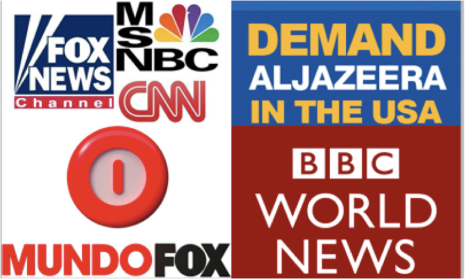By Kelsey Heckert
In a free market, the “rule of three” suggests that there are always three major players in any one industry. Let’s name some examples: as a Michigander, the first “Big 3” that comes to mind is obviously Ford, General Motors, and Chrysler; as a media and communications student, another “Big 3” is ABC, CBS, and NBC; and as a sports fan, I’m prone to naming the NFL, NBA, and MLB.
While these companies and organizations often hold the largest market share, there have been historically been shifts and other up-and-comers entering the competition. For example, international car companies like BMW and Honda are known for luxurious, high-quality cars; the establishment of Fox in the 1980s has proven successful as it segmented a younger, more diverse audience; and the NHL gets plenty of attention come play-off time.
The “rule of three” can also be applied to major news channels in the United States, like CNN, Fox News, and MSNBC. Once again, potential international competitors are inching closer to the market, but for the purposes of objective news, I say the more the merrier. With more people watching a news channel that is “Fair and Balanced” to offset the “World Leader in News” alongside a channel encouraging to viewers to “Lean Forward,” more options might not be such a bad idea.
Enter the potential options:
Earlier last week, news broke that ABC News and Univision are in talks of creating a new news channel, targeting English-speaking Hispanic viewers. This channel would have to go up against the likes of CNN, Fox News, and MSNBC. The idea is conceivable and marketable. Not only would Univision get a break into an English-language market, ABC News would get a cable outlet to give it a fairer shot to compete with MSNBC. The target audience, in this case, is still an untapped resource. Hispanic U.S. citizens are the largest minority group to the point that they will soon become a majority according to the given population growth rate. Offering news content to a large population that feels unserved will most likely lead to success and profit, especially with the advertising revenue potential.
Before ABC and Univision’s announcement, News Corporation announced last month its intent to launch MundoFox alongside Colombian broadcaster RCN Television. MundoFox will be a Spanish-language news channel offered in the United States.
BBC World News has been trying to enter the United States television channel line-up actively for the past 5 years now. BBC says that it is trying to tap into a need for impartial international news on cable. Although it hasn’t had much success in the market compared to the top players, the BBC World News channel won a Peabody in 2010 for being “a nightly newscast like none in the United States has ever had. It places our actions and concerns in a global context.” The president of BBC Worldwide America, Herb Scannell, has created a plan for two clearly defined cable channels—BBC America and BBC World News.
Similarly, Al Jazeera English has been trying to enter American households, especially recently due to its revered coverage of the “Arab Spring” and similar Middle Eastern uprisings. Al Jazeera English is an affiliate of Al Jazeera, a news organization broadcasted in Qatar. AJE has proved to be a renowned news organization amongst the world, however there have been several business moves that have blocked AJE from being offered on cable. For example, in 2007, industry giant Comcast originally planned to carry Al Jazeera English yet recalled their decision at the last minute citing the already-saturated television market. While AJE continues to battle with the cable industry, they have launched their own initiatives. Firstly, AJE streams live feed off its website for its loyal fans. They have also initiated their own “Demand Al Jazeera in the USA,” allowing U.S. citizens to sign a petition, targeting specific cable companies.
In a perfect free-market world, all of these news channels would eventually be granted access into U.S. homes, however the free-market world openly supports the successes of conglomerates. Therefore, I would gather that we’ll be seeing MundoFox and the new Disney-Univision news channel before the revered BBC and Al Jazeera English. While the free-market allows for competition, it also rewards mega-house conglomerates. News Corp and Disney are already U.S. household names—we’ll be seeing them soon.

